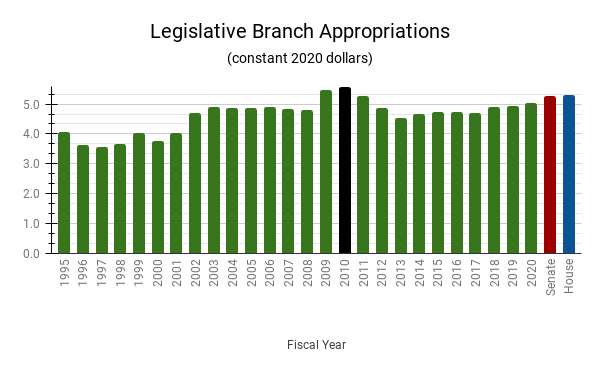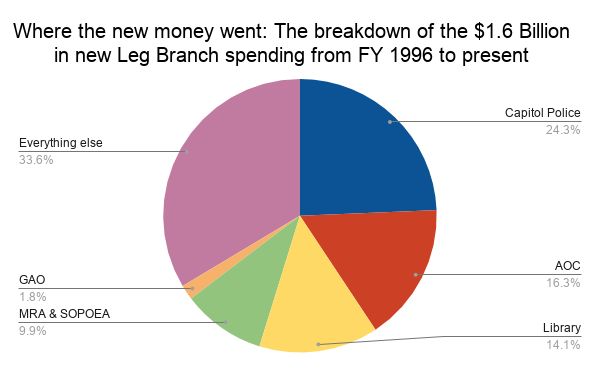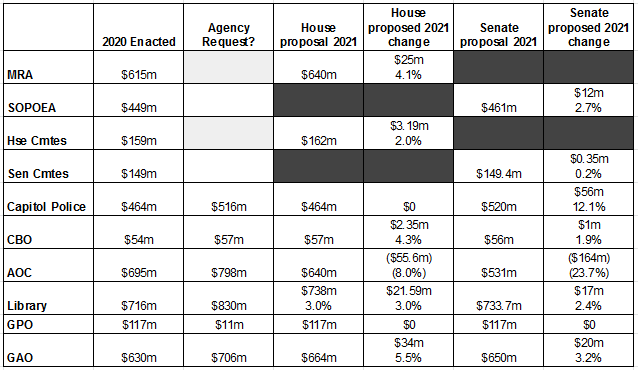TOP LINE
The next two months will be a legislative train wreck. On deck are the FY 2021 spending bills, COVID relief, the NDAA, and a ton of pent-up legislation. Notably, Republican Senators finally released draft text for the FY 2021 spending bills with less than a month until a shutdown. In addition, new Members are in the middle of orientation, Senators just voted on leadership rosters and House Dems will be voting remotely on theirs, disputed Committee Chairs and party rules will be decided in short order, and on the horizon are a new House rules package and legislative planning for the 117th Congress… assuming any legislation moves.
Well, that’s settled. President Trump backhandedly recognized Pres. Biden’s election in a tweet this weekend that simultaneously falsely contested the election results as a “rigged.” He reversed himself in a subsequent tweet. Elections rumble on in Georgia while the incoming Biden administration is blocked from engaging with the agencies and getting classified briefings; also congressional Republican leadership still won’t publicly acknowledge Pres.-elect Biden.
Amid the COVID tsunami, the House Admin Committee certified the existence of secure tech tool for remote voting; the next step is the House Rules Committee promulgating regulations. The report is worth a read: it acknowledged problems with proxy voting; outlined steps the House took to support electronic processes; and covered the tremendous amount of work that’s happening remotely. It outlines a welcome process change: public reporting of floor votes in real time. Speaker Pelosi has not been a huge fan of remote voting, but maybe the increasing tempo required for legislating and the metastasizing pandemic will change her mind. We’ve been all over this issue: check out our resources page on Continuity of Congress and our many reports. In the meantime, the emergency proxy voting period has been extended through the end of the year.
Dinner theater. I probably shouldn’t highlight this, but House leadership had planned a nice dinner for new Members in Statuary Hall before receiving blowback because having Members eating together inside is not only poorly advised, it’s bad messaging. Please stay safe, everyone.
Before we jump in, if you’re new to our newsletter or are reading a forwarded email, why not subscribe? Also, don’t hesitate to drop us a line.
APPROPRIATIONS
Senate Republicans released draft spending bills and 302(b) allocations — the amount of money each appropriations subcommittee has to work with — and the clock is ticking down to December 11th. There’s increasing talk about the need for any approps bill to pass both chambers by 2/3s in case Trump vetoes it, which is as insane as it was totally foreseeable and preventable. The Senate appropriations bills would have been strengthened if they had gone through the normal legislative process — consideration in subcommittee, full committee, or on the floor.
Someone with more free time than we have can do the side-by-side comparison of the Senate’s proposed 302(b) allocations and the House’s proposal. The way they report the data makes it hard to compare the numbers. How is spending broken out between defense vs. non-defense? Is emergency spending including? How do these numbers compare to historic spending levels? We can’t tell. If you figure it out, please let us know.
As Legislative branch enthusiasts, we naturally are honing in on how much money is available for appropriation by its appropriations subcommittee. Funding for Congress has grown at half the rate as other non-defense discretionary spending and you can see the unfortunate results everywhere. You may remember a civil society letter from June calling for a 10% increase in Legislative branch funding, or $504.9 million, over the FY 2020 enacted level of $5.049 billion. (For context, we are using FY 2010 as our baseline of appropriate Congressional funding levels, which was funded at $5.573 billion and would have required a 10.3% increase over FY 2020 to get back to neutral.) House Appropriators met our call halfway — which we heartily applaud — with a proposed funding level of $5.300 billion, a 4.97% increase, or $251 million. Senate Appropriators have now come in at $5.266 billion, a 4.29% increase, or $217 million. We hope that the Senate will come up an additional $34 million and that Appropriators make up the remaining gap in FY 2022.

More than the bottom line number matters. What you can’t tell from the chart, above, is that almost 25% of Leg. branch growth over the last 25 years can be attributed to the $400 million (inflation-adjusted) increase in the Capitol Police budget. The following graphic shows where the Legislative branch has been making new investments: it’s primarily in the Capitol Police, the Architect of the Capitol, and the Library.

Wait, the Capitol Police? We did the math and what sticks out like a sore thumb is the Senate’s decision to increase Capitol Police funding by $56 million, which is a 12% increase over current funding — and the USCP regularly gets major increases in their funding. To put this in context, if the Capitol Police were a city — their actual extended jurisdiction is under two square miles — they would now have the twelfth largest policing budget, falling between San Diego at $542 million and Austin at $491 million. That amount is sky high, especially as other police departments exist in the Washington, D.C. metro area and USCP funding has gone up by 291% percent (so far) since 1995. The House, by comparison, has proposed to keep the USCP at current funding levels while imposing new accountability requirements on the infamously untransparent police force.
What are Appropriators priorities? Fortunately, we see some bright spots. Both the House and Senate would increase funding for personal offices, by 4.1% and 2.7% respectively. (More will be necessary.) The House would increase funding for its committees by 2%, although House Committees are underfunded by $100 million so there’s a long way to go. The Senate would keep committee funding flat, which doesn’t address their $30 million shortfall. Both chambers keep GPO flat, give CBO a modest bump, and the same for the Library. The House would plus-up GAO by 5.5% in light of the trillions of dollars that just went out the door, but the Senate would increase it only by 3.2%; given GAO’s ability to save the government money, it could stand more funding. The shocker comes with the Architect, which gets an 8% cut from the House and a huge 23% cut from the Senate. We haven’t figured out why there’s such a disparity. Were it up to us, we’d pour money into the MRA, the SOPOEA, the Committees, and GAO, and figure out if there’s another way to pay for the Capitol Police or right-size their operations. Many of these problems, however, are driven by an undersized allocation for the Legislative branch.
Here’s how this breaks out:

We did look at the committee reports. House Appropriators included a ton of incredible reforms in their committee report language — we identified at least 83 items. We did not identify anything significant in the Senate’s explanatory statement, which has included a number of significant and welcome reform efforts in prior years, but we note with favor that the Senate’s language did not cancel out any of the recommendations from the House side and did include salutary cybersecurity language. Here’s what we were looking for.
NEW MEMBER RESOURCES
New member orientation is underway (see for yourself) forover 50 newly-elected House Members — for races that are still too close to call both candidates are invited to participate. The programming available this year includes: the official House orientation (Nov. 12-21; Nov. 30-Dec. 5); Senate orientation (dates unknown), the Heritage Foundation (last week), Harvard’s Institute of Politics (Dec. 7-8, 14-15), the Tech, Science, and Data Cohort (Dec. 9), and CMF’s “Life in Congress: What to Expect for You, Your Staff, and Your Family” event (Dec. 16).
Having trouble sleeping? I did a short video on how the House adopts new rules. We also compiled a bunch of resources for new members that provide answers to some questions you might not know to ask. House Admin also has resource-packed handbooks for Members.
Nu? New Members can hire a full-time transition aide with funds from the CAO; this is a first for the House. (The Senate has had it for a while.) The change was among recommendations from the Select Committee on the Modernization of Congress.
Speaking of the Select Committee, a coalition of 38 organizations and 16 experts on Congress (including former Members) today released a letter calling on the House to continue the SCOMC in the 117th Congress.
LEADERSHIP RACES
Senate leadership slates were set last week. Sens. McConnell & Schumer retained their spots at the top; we can’t say who will be the Majority Leader until the Georgia runoff races are settled. Republicans added Sen. Rick Scott to run the NRSC, Dems added Sens. Booker and Cortez Masto.
House leadership elections will take place mostly remotely this week, according to POLITICO, there will be zoom presentations and voting on an internal app. The Democratic Caucus will meet tomorrow, followed by leadership elections Thursday & Friday; Committee and DCCC Chair votes are the week after Thanksgiving.
• There’s some musical chairs going on with Rep. Bustos stepping down as DCCC Chair; she’s landing on her feet with a promotion of sorts, serving as co-chair of the Democratic Steering & Policy Committee, which is responsible for placing members on committees. Rep. Bustos is taking the spot vacated by Rep. DeLauro, who is running for Approps Chair. DCCC Chair candidates to replace Rep. Bustos include Reps. Cardenas, Sanchez, Sean Patrick Maloney and Veasey; meanwhile Vice Chair of the Caucus is also up for grabs.
Will Pelosi go? Rep. Elissa Slotkin said she won’t vote for her, but even with House Dems losing seats, it’s not clear how many others will withhold their votes. At most House Dems will hold 227 seats, or at fewest 222, which means any small group of Members will have a lot of leverage.
Changes to the Progressive Caucus Rules could increase the group’s power and agility. Newly-approved rules implement a single-Chair model and require bloc voting on proposals approved by 2/3s of the caucus as well as regular attendance.
Congressional Black Caucus Chair Karen Bass will be term limited out next Congress and Rep. Joyce Beatty is running to succeed her.
CONGRESSIONAL OPS
Congress, especially among staff, has a representation problem, and while things are moving in the right direction, Members can and should consult with the Office of Diversity and Inclusion and staff organizations throughout their hiring processes to address discrepancies.
The SCOMC included recommendations partially addressing barriers to entry for a career on the Hill, which Jennifer Graciano highlights in a recent article. She notes that a less diverse legislature means “less responsiveness to issues that are most prevalent among minorities.”
COVID in the Capitol: NPR has some great visuals illustrating the timeline of covid hitting Congress as well as which Members have been affected. (We still love GovTrack’s COVID tracker.)
What’s next? We are hearing many senior hill staffers are in contention for the Biden administration. Having experienced legislative hands in the Executive branch would be a welcome change, but we do worry about the effects of losing so many talented staff.
ODDS & ENDS
Former Speaker Pelosi Chief of Staff Nadeam Elshami and former Rep. Ed Royce are now lobbying for the Egyptian government led by Dictator Abdel Fattah al-Sisi.
Barr Bar Complaint. Former DC Bar leaders’ call for an investigation of the Attorney General suggests a missed opportunity for the House..
Capitol Police reported four arrests last week including an instance of attempted trespassing at the Capitol.
EVENTS
New Member orientation in the House continues this week.
The House is in this week; here’s the floor schedule and combined committee schedule. The Senate also resumes on Monday, where it will consider yet another judicial nomination.
Down the Line
• Advisory Committee on the Records of Congress is holding their next meeting on Monday, December 7th, 2020 at 1pm. Register here.